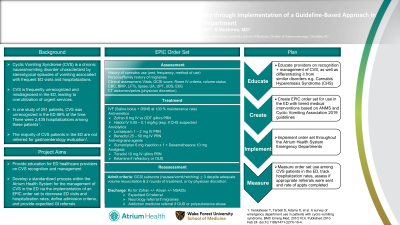Sunday Poster Session
Category: Practice Management
P1220 - Refining Patient Care in Cyclic Vomiting Syndrome: Enhancing Quality Through Implementation of a Guideline-Based Approach in the Emergency Department
Sunday, October 22, 2023
3:30 PM - 7:00 PM PT
Location: Exhibit Hall

Has Audio

Jonathan D. Dvorak, MD
Atrium Health Carolinas Medical Center
Charlotte, NC
Presenting Author(s)
Award: Presidential Poster Award
Jonathan D. Dvorak, MD1, Shadab Saboori, MD2, Mackenzie Mcarthur, PA-C1, Baharak Moshiree, MD, MSc2
1Atrium Health Carolinas Medical Center, Charlotte, NC; 2Atrium Health, Wake Forest Medical University, Charlotte, NC
Introduction: Cyclic Vomiting Syndrome (CVS) poses significant challenges in patient management, with its chronic nausea and vomiting episodes often resulting in frequent ED visits and hospitalizations. It is often unrecognized in the ED setting (in one study 88% of the time), leading to excessive reliance on urgent services and suboptimal care provision. Alarmingly, the majority of patients are not referred for essential GI evaluations, further impeding their access to comprehensive care.
Methods: We collaborated with our ED colleagues through the Patient Care Alignment Committee to optimize our EPIC EMR order set and achieve our objectives of minimizing ED visits and admissions among CVS patients. To achieve this, our primary steps are twofold: enhance provider education on CVS recognition and develop an ED electronic order set. This order set will incorporate tiered-medication interventions aligned with the 2019 guidelines from the ANMS and the Cyclic Vomiting Association. It is also designed based on feedback from involved providers. By implementing effective strategies, we aim to prevent hospitalization, ensure timely referrals to GI specialists, and ultimately optimize preventative therapy for CVS patients. We hypothesize that the combination of provider education, structured order set use, inpatient admission criterion, and expedited GI referral process will decrease future ER visit rates, admission rates, and hospital length of stay, for CVS patients compared with prior to protocol implementation.
Results: Our order set includes tiered medical interventions based on ANMS guideline therapies to abort CVS episodes. We have developed admission criteria which includes assessing baseline versus post-treatment GCSI scores and Nausea/Retching/Vomiting subscores, to identify treatment success and failure, as well as to determine who requires hospitalization versus outpatient follow-up. The order set provides discharge instructions regarding prescription medications and expedited GI referrals, as well as addiction medicine if needed for marijuana abuse. Our protocol is to be implemented throughout several Atrium Health facilities. We will measure the frequency order set use, track hospitalization rates, and whether appropriate GI referrals are placed.
Discussion: CVS is frequently unrecognized in the ED leading to suboptimal care. Patient care can be improved through implementation of provider education and electronic order set-based tiered-interventions utilizing guideline-based therapies.
Disclosures:
Jonathan D. Dvorak, MD1, Shadab Saboori, MD2, Mackenzie Mcarthur, PA-C1, Baharak Moshiree, MD, MSc2. P1220 - Refining Patient Care in Cyclic Vomiting Syndrome: Enhancing Quality Through Implementation of a Guideline-Based Approach in the Emergency Department, ACG 2023 Annual Scientific Meeting Abstracts. Vancouver, BC, Canada: American College of Gastroenterology.
Jonathan D. Dvorak, MD1, Shadab Saboori, MD2, Mackenzie Mcarthur, PA-C1, Baharak Moshiree, MD, MSc2
1Atrium Health Carolinas Medical Center, Charlotte, NC; 2Atrium Health, Wake Forest Medical University, Charlotte, NC
Introduction: Cyclic Vomiting Syndrome (CVS) poses significant challenges in patient management, with its chronic nausea and vomiting episodes often resulting in frequent ED visits and hospitalizations. It is often unrecognized in the ED setting (in one study 88% of the time), leading to excessive reliance on urgent services and suboptimal care provision. Alarmingly, the majority of patients are not referred for essential GI evaluations, further impeding their access to comprehensive care.
Methods: We collaborated with our ED colleagues through the Patient Care Alignment Committee to optimize our EPIC EMR order set and achieve our objectives of minimizing ED visits and admissions among CVS patients. To achieve this, our primary steps are twofold: enhance provider education on CVS recognition and develop an ED electronic order set. This order set will incorporate tiered-medication interventions aligned with the 2019 guidelines from the ANMS and the Cyclic Vomiting Association. It is also designed based on feedback from involved providers. By implementing effective strategies, we aim to prevent hospitalization, ensure timely referrals to GI specialists, and ultimately optimize preventative therapy for CVS patients. We hypothesize that the combination of provider education, structured order set use, inpatient admission criterion, and expedited GI referral process will decrease future ER visit rates, admission rates, and hospital length of stay, for CVS patients compared with prior to protocol implementation.
Results: Our order set includes tiered medical interventions based on ANMS guideline therapies to abort CVS episodes. We have developed admission criteria which includes assessing baseline versus post-treatment GCSI scores and Nausea/Retching/Vomiting subscores, to identify treatment success and failure, as well as to determine who requires hospitalization versus outpatient follow-up. The order set provides discharge instructions regarding prescription medications and expedited GI referrals, as well as addiction medicine if needed for marijuana abuse. Our protocol is to be implemented throughout several Atrium Health facilities. We will measure the frequency order set use, track hospitalization rates, and whether appropriate GI referrals are placed.
Discussion: CVS is frequently unrecognized in the ED leading to suboptimal care. Patient care can be improved through implementation of provider education and electronic order set-based tiered-interventions utilizing guideline-based therapies.
Disclosures:
Jonathan Dvorak indicated no relevant financial relationships.
Shadab Saboori indicated no relevant financial relationships.
Mackenzie Mcarthur indicated no relevant financial relationships.
Baharak Moshiree indicated no relevant financial relationships.
Jonathan D. Dvorak, MD1, Shadab Saboori, MD2, Mackenzie Mcarthur, PA-C1, Baharak Moshiree, MD, MSc2. P1220 - Refining Patient Care in Cyclic Vomiting Syndrome: Enhancing Quality Through Implementation of a Guideline-Based Approach in the Emergency Department, ACG 2023 Annual Scientific Meeting Abstracts. Vancouver, BC, Canada: American College of Gastroenterology.

